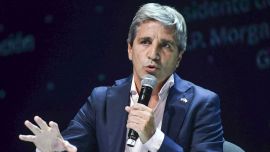The four founding members of the Mercosur trade bloc are aligned in their desire to close the long-stalled free-trade with the European Union, according to reports.
Ahead of a crunch two-day summit in Montevideo that started Thursday, reporting in local outlets said that the leaders from Brazil, Argentina, Uruguay and Paraguay – the bloc’s main members– are keen to wrap up negotiations as soon as possible.
The news emerged that European Commission President Ursula von der Leyen flew to Montevideo despite renewed criticism of the planned accord from Italy and France.
Uruguay is hosting the 65th Mercosur summit this Thursday and Friday as it currently holds the pro-tempore presidency of the South American bloc.
Speaking Thursday, von der Leyen said the controversial free-trade deal between the EU and South American bloc was "in sight," but her hopes of sealing the pact at a summit this week appeared slim after a flurry of last-minute resistance.
Von der Leyen arrived in Montevideo to attend the two-day summit of leaders from Brazil, Argentina, Uruguay and Paraguay, the four countries with which the European Union hopes to create the world's biggest free-trade zone. Bolivia, while part of the Mercosur, is not part of the negotiations given they began before it joined as a full member.
"The finish line of the EU-Mercosur agreement is in sight. Let's work, let's cross it," Von der Leyen wrote on X of the deal, which has been in the works for over 20 years.
But her plans appeared in jeopardy after Italian government sources said Thursday the "conditions are not in place" for Rome to sign the accord, potentially giving naysayers in Europe the power to block it.
The deal would allow the EU to export cars, machinery and pharmaceutical products more easily to South America.
In return, Brazil and its neighbours would be able to sell meat, sugar, rice, honey, soybeans and other products to Europe with fewer restrictions.
A large majority of EU member states, led by Von der Leyen's native Germany and Spain, are in favour of it.
But with Italy and Poland set against, and the Netherlands and Austria also expressing reservations, France appeared close to having the blocking minority of at least four countries representing 35 percent of the EU's population needed to stop the deal advancing.
'Unacceptable'
Farmers in the EU fear the deal would see Europe flooded with cheap imports from countries where producers operate to less stringent environmental, sanitary and labour standards.
French President Emmanuel Macron on Thursday repeated a warning to Von der Leyen that the agreement was "unacceptable in its current state."
The treaty, under discussion since 1999, aims to eliminate most customs duties between the EU and Mercosur to create a vast market of more than 700 million consumers.
A political agreement was concluded in June 2019 but never ratified amid concerns over the impact of Brazilian farming on climate change, among other factors.
Sources familiar with the negotiations told AFP the new deal would include changes to "several chapters," including government contracts, services, intellectual property and the environment.
Von der Leyen planned to stage joint news conference on Friday in Uruguay with the presidents of Brazil, Argentina, Paraguay and Uruguay.
‘The Commission decides'
NGOs and left-wing activists believe that the creation of a vast free-trade zone will accelerate deforestation in the Amazon and worsen the climate crisis by increasing greenhouse gas emissions.
The push by the EU and Brazil particularly to get the deal done comes as Macron appears politically weakened after his government collapsed Wednesday in a no-confidence vote – the first time a French government has been brought down by parliament in over 60 years.
Brazil's President Luiz Inácio Lula da Silva has shrugged off France's opposition, saying: "They no longer decide anything, it's the European Commission that decides."
But once a possible deal is signed with Mercosur countries, it will need to be ratified by at least 15 EU members representing 65 percent of the EU population, then by a majority in the European Parliament.
Ignacio Bartesaghi, a professor of international relations at the Catholic University of Uruguay, said it was important for Lula to "show some success in Mercosur" to fend off pressure from Argentina and Uruguay for Mercosur states to be allowed to cut bilateral trade deals outside the bloc.
Argentina's President Javier Milei is pushing for a free-trade deal with the United States, but he would need Mercosur’s approval as things currently stand.
– TIMES/AFP/NA





















Comments